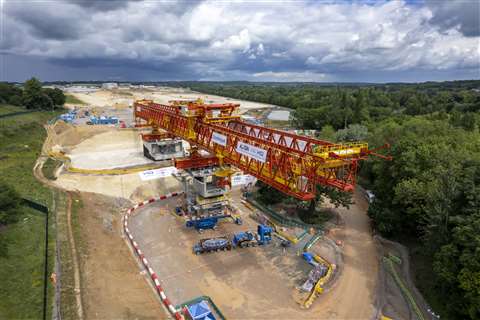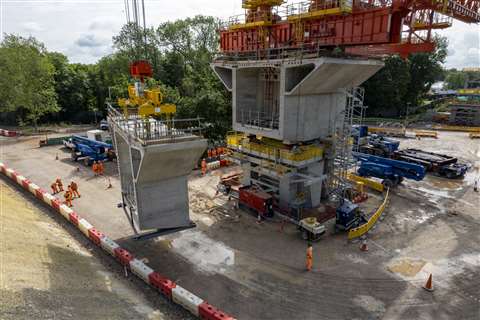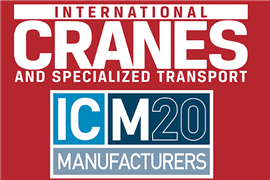Construction starts on UK’s longest railway bridge
07 June 2022
Construction work has started on the Colne Valley Viaduct, a railway bridge in the west of Greater London, that will form a key part of the controversial multi-billion-euro High Speed 2 (HS2) rail network.
 Construction starts on the Colne Valley Viaduct, with the launch of the giant bridge-building machine Dominique. Photo: HS2
Construction starts on the Colne Valley Viaduct, with the launch of the giant bridge-building machine Dominique. Photo: HS2
The Align JV – a team made up of Bouygues Travaux Publics, Sir Robert McAlpine and VolkerFitzpatrick – is responsible for the construction of the bridge, which will be the longest in the UK, extending for 3.2km, across a stretch of lakes and waterways.
Work began with the launch of a one-of-a-kind 700-tonne bridge-building machine, known as the launching girder and officially named Dominique. This a 160m-long machine will manoeuvre the bridge’s huge concrete deck segments into position.
Each of these 140-tonne concrete segments is cast at a nearby factory built for the purpose, before being placed on a trailer and delivered to the site for positioning.
A total of one thousand of these segments will be needed and each has a unique shape, allowing for the curves of the viaduct.
As the deck segments are being cast, so are the 56 piers that will hold them. Each pier, weighing around 370 tonnes, will have a deck segment placed on either side, using a cantilever approach to balance the structure, while two half-arches are constructed. At this point, steel tensioning cables will be threaded through the segments to give strength to the bridge.
 The bridge-building machine lifts one of the 140-tonne deck segments on the Colne Valley Viaduct project. Photo: HS2
The bridge-building machine lifts one of the 140-tonne deck segments on the Colne Valley Viaduct project. Photo: HS2
Align says it expects to have around 12 segments case every week to maintain progress on the project.
HS2 minister, Andrew Stephenson attended the launch event. He said the bridge’s construction represented “a landmark moment for HS2 and a feat of British engineering, taking the HS2 line from London, and into Hertfordshire and Buckinghamshire.”
He added, “Infrastructure is the backbone of HS2 and this viaduct will be integral to delivering faster journeys and an increased capacity rail network.”
Once operational, HS2 is set to improve rail links between London, Birmingham and the north of England, with trains expected to run at speeds of up to 200km/h.
While it will form a major part of the UK Government’s plans to bolster the country’s economy beyond London and its environs, the project remains controversial, with a price tag that could exceed €100 billion and many protesting its potential to cause environmental damage.
STAY CONNECTED


Receive the information you need when you need it through our world-leading magazines, newsletters and daily briefings.
CONNECT WITH THE TEAM











